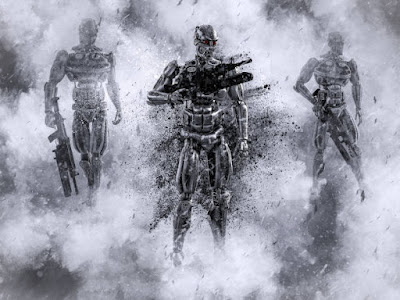Berserkers are intelligent killing robots initially described by science fiction and fantasy novelist Fred Saberhagen (1930–2007) in his 1962 short tale "Without a Thought." Berserkers later emerged as frequent antagonists in many more of Saberhagen's books and novellas.
Berserkers are a sentient, self-replicating race of
space-faring robots with the mission of annihilating all life.
They were built as an ultimate doomsday weapon in a
long-forgotten interplanetary conflict between two extraterrestrial cultures
(i.e., one intended as a threat or deterrent more than actual use).
The facts of how the Berserkers were released are lost to
time, since they seem to have killed off their creators as well as their foes
and have been ravaging the Milky Way galaxy ever since.
They come in a variety of sizes, from human-scale units to
heavily armored planetoids (cf.
Death Star), and are equipped with a variety of weaponry
capable of sterilizing worlds.
Any sentient species that fights back, such as humans, is a
priority for the Berserkers.
They construct factories in order to duplicate and better
themselves, but their basic objective of removing life remains unchanged.
It's uncertain how far they evolve; some individual units end up questioning or even changing their intentions, while others gain strategic brilliance (e.g., Brother Assassin, "Mr.Jester," Rogue Berserker, Shiva in Steel).
While the Berserkers' ultimate purpose of annihilating all
life is evident, their tactical activities are uncertain owing to
unpredictability in their cores caused by radioactive decay.
Their name is derived from Norse mythology's Berserkers,
powerful human warriors who battled in a fury.
Berserkers depict a worst-case scenario for artificial
intelligence: murdering robots that think, learn, and reproduce in a wild and
emotionless manner.
They demonstrate the deadly arrogance of providing AI with
strong weapons, harmful purpose, and unrestrained self-replication in order to
transcend its creators' comprehension and control.
If Berserkers are ever developed and released, they may
represent an inexhaustible danger to living creatures over enormous swaths of
space and time.
They're quite hard to get rid of after they've been
unbottled.
This is owing to their superior defenses and weaponry, as
well as their widespread distribution, ability to repair and multiply,
autonomous functioning (i.e., without centralized control), capacity to learn
and adapt, and limitless patience to lay in wait.
The discovery of Berserkers is so horrifying in Saberhagen's
books that human civilizations are terrified of constructing their own AI for
fear that it may turn against its creators.
Some astute humans, on the other hand, find a fascinating
Berserker counter-weapon: Qwib-Qwibs, self-replicating robots designed to
eliminate all Berserkers rather than all life ("Itself Surprised" by
Roger Zelazny).
Humans have also utilized cyborgs as an anti-Berserker
technique, pushing the boundaries of what constitutes biological intelligence
(Berserker Man, Ber serker Prime, Berserker Kill).
Berserkers also exemplifies artificial intelligence's
potential for inscrutability and strangeness.
Even while Berserkers can communicate with each other, their
huge brains are generally unintelligible to sentient organic lifeforms fleeing
or battling them, and they are difficult to study owing to their proclivity to
self-destruct if caught.
What can be deduced from their reasoning is that they see
life as a plague, a material illness that must be eradicated.
In consequence, the Berserkers lack a thorough understanding
of biological intellect and have never been able to adequately duplicate
organic life, despite several tries.
They do, however, sometimes enlist human defectors (dubbed
"goodlife") to aid the Berserkers in their struggle against
"badlife" (i.e., any life that resists extermination).
Nonetheless, Berserkers and humans think in almost
irreconcilable ways, hindering attempts to reach a common understanding between
life and nonlife.
The seeming contrasts between human and machine intellect
are at the heart of most of the conflict in the tales (e.g., artistic
appreciation, empathy for animals, a sense of humor, a tendency to make
mistakes, the use of acronyms for mnemonics, and even fake encyclopedia entries
made to detect pla giarism).
Berserkers have been known to be defeated by non-intelligent
living forms such as plants and mantis shrimp ("Pressure" and
"Smasher").
Berserkers may be seen of as a specific example of the von
Neumann probe, which was invented by mathematician and physicist John von
Neumann (1903–1957): self-replicating space-faring robots that might be
deployed over the galaxy to efficiently investigate it In the Berserker tales,
the Turing Test, developed by mathematician and computer scientist Alan Turing
(1912–1954), is both investigated and upended.
In "Inhuman Error," human castaways compete with a
Berserker to persuade a rescue crew that they are human, while in "Without
a Thought," a Berserker tries to figure out whether its game opponent is
human.
The Fermi paradox—the concept that if intelligent
extraterrestrial civilizations exist, we should have heard from them by now—is
also explained by Berserkers.
It's possible that extraterrestrial civilizations haven't
contacted Earth because they were destroyed by Berserker-like robots or are
hiding from them.
Berserkers, or anything like them, have featured in a number
of science fiction books in addition to Saberhagen's (e.g., works by Greg Bear,
Gregory Benford, David Brin, Ann Leckie, and Martha Wells; the Terminator
series of movies; and the Mass Effect series of video games).
All of these instances demonstrate how the potential for
existential risks posed by AI may be investigated in the lab of fiction.
~ Jai Krishna Ponnappan
You may also want to read more about Artificial Intelligence here.
See also:
de Garis, Hugo; Superintelligence; The Terminator.
Further Reading
Saberhagen, Fred. 2015a. Berserkers: The Early Tales. Albuquerque: JSS Literary Productions.
Saberhagen, Fred. 2015b. Berserkers: The Later Tales. Albuquerque: JSS Literary Productions.
Saberhagen’s Worlds of SF and Fantasy. http://www.berserker.com.
The TAJ: Official Fan site of Fred Saberhagen’s Berserker® Universe. http://www.berserkerfan.org.



